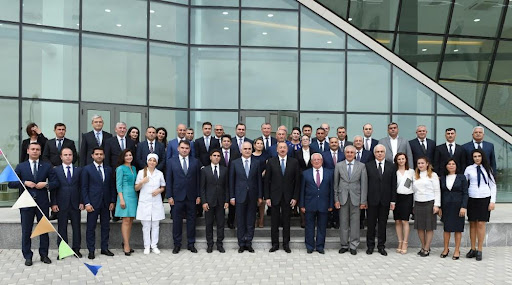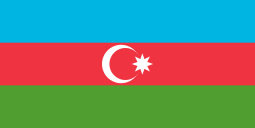
President Aliyev: “There is an opportunity now without losing time to engage Trans-Balkan pipeline, and we are ready”
“We need a transit arrangement with Turkiye, unfortunately, we did not get to that point yet”
26 November 2022
Speaking at the opening of the conference under the motto “Along the Middle Corridor: Geopolitics, security and economy” in Baku, Azerbaijani President Ilham Aliyev made a number of important statements. Regarding plans to meet the growing demand for natural gas in Europe, President Aliyev said:
“We will continue our cooperation with foreign oil companies which plan to increase gas production from existing fields and also the new fields which will be operational starting from next year, particularly, huge gas condensate Absheron field will start production next year and the first phase of production will be 1.5 billion cubic meters.”.
Aliyev noted that at the same time, Azerbaijan needs to expand the existing pipeline system, despite the fact that it is completely new:
“We just completed less than two years ago the final segment of the Southern Gas Corridor Trans Adriatic Pipeline (TAP) but already today, we see the demand to expand the capacity twice from ten to twenty bcm. That will need, of course, a consolidated position and investments of all shareholders. Azerbaijan has only twenty percent share in TAP. Therefore, we hope with partners we will get to that point, and also expansion of TANAP from 16 to 32 billion cubic meters. Because capacity of TANAP is almost fully engaged. So, all that will need, of course, additional investments. Of course, for that we will need to have the arrangements of transit with our Turkish colleagues”.
For the first time in many years, the head of Azerbaijan admitted that he has difficulties in reaching an agreement with Turkey, although it is in the interests of both European and Turkish consumers:
“There is an opportunity now without losing time to engage Trans-Balkan pipeline, especially, after interconnector between Greece and Bulgaria was inaugurated last month, and we are ready. The capacity of that pipeline is 3 bcm. So, we are ready to supply necessary volumes maybe within one month. But for that we need a transit arrangement with Turkiye, unfortunately, we did not get to that point yet. Negotiations continue. They last more time than we anticipated but hopefully we will come to that agreement. Because if it is not reached due to some reasons then all our plans to supply additional gas to Turkiye and to Europe will be under threat”.
In July, 2022 Azerbaijan signed a MoU with the European Commission doubling supplies. According to President Aliyev, the country has such potential:
“First, new gas fields which we plan to commission in the coming years… Second, serious reforms in our energy company SOCAR - new management, corporate management. Transparency and efficiency will save us additional volumes of gas. And also, our projects which already started with international investors with respect to renewables. Two projects are already in the pipeline. 470 megawatts of wind and solar energy will be available probably by the end of next year. Plus, 230 solar megawatt plant in Jabrayil will be added to that. So, that will save us additional gas. In other words, we will be able to implement fully the MoU with the European Commission which we signed in July, but for that we need to finalize our arrangements with our Turkish friends and I hope that it will be the case sooner than later”.
Aliyev: “The Zangazur corridor we discussed with Russian officials”.
Armenia is a satellite country, in other words, a dependent country. Thus, we are negotiating with Russia instead.
President Ilham Aliyev said that Azerbaijan has a “very great level of dynamism in the development of relations with many countries, especially after the pandemic, when international travel becomes part of our life” again. At the conference entitled “Along the Middle Corridor: Geopolitics, Security and Economy” held in Baku at ADA University, he said:
“I spent a lot of time in Central Asian countries. I visited Uzbekistan three times since this April, on an official visit and for international events, I visited Kyrgyzstan on a state visit. President of Kazakhstan was on an official visit here this August, and also, before that I visited Turkmenistan. I am planning to visit Tajikistan next year. I have an invitation from President. Also, on the sidelines of international events we always use time to talk, because a lot of things are happening and we must be ready for that. Speaking at the Summit of the Organization of Turkic States, I pointed to the issue of security, because now security becomes maybe more important than ever before. And countries which have traditional ties must address this issue on their bilateral track and also multilateral and see how we can support each other, because world has changed”.
Aliyev noted that in the modern world “international law is not working, or working selectively”:
“If you have a power, if you have a strong army, if you have good allies then you can feel yourself on the safe side. Therefore, I think that the connectivity projects which we are implementing will lead to more regional security and stability and there is a great chance to accomplish them. As far as we are concerned in Azerbaijan, all the transportation projects whether it’s East-West or North-South, railroad or highway airports of lead, or sea port, everything is ready. So, the same level of readiness must be in all the countries on route of the corridor. Is it the case? No. But we see the positive dynamics. For instance, at one of the international events which I participated relatively recently, there was an agreement signed on construction of railroad between China, Kyrgyzstan and Uzbekistan. This project was on hold for many years. But now everybody understands that there is a need to bring cargoes towards the Caspian, to engage Trans Caspian opportunities to a large degree”.
The President spoke about plans to create a giant trans-Caspian transport hub:
“We have excellent relations with Pakistan and I know that the Gwadar Port of Pakistan is transforming into a big international hub. And to connect Gwadar Port with our infrastructure is not a difficult thing, just to properly address the issue of tariffs, legal framework, coordination on regulation and to have a team work. We have started the trilateral format of active cooperation between Azerbaijan, Turkiye and Kazakhstan. The first meeting of foreign ministers and transportation ministers took place several months ago. Now the second meeting and our neighbor Georgia is invited. It will be a meeting of four countries, because we are all interconnected and we need to have a single policy. Because if any country will try to achieve more than it can then it will not work”.
Will Iran and Armenia be able to disrupt this process? Does this question being mentioned mean that the threat is certain?
“I don’t think so, - President Aliyev said about such threats. - First, Armenia has neither geographical nor any other capability or advantages in the region. It’s actually a deadlock country. No transportation route crosses Armenia. Their transportation network is outdated and do not belong to them. Their railroads belong to “Rossiyskie Jeleznie Dorogi”, RJD, Russian railroad company. Actually, our discussions on the Zangazur corridor we have with Russia not with Armenia, because Armenia is a satellite country it’s a dependent country. Its independence is very symbolic and we are not going to waste time negotiating with them, we are negotiating with Russia. By the way, during my recent communications with Russian officials we discussed the Zangazur corridor, and I don’t think that Armenia will be able to block this project. As far as Iran is concerned, I also don’t think that will be the case, because Iran itself should be interested in regional connectivity projects. Because these projects are not against anyone. They are for the benefit. So, if we manage to establish a platform of sincere cooperation and a shared benefit approach with all the players, it will work. If not then it will probably work partially. So, it will depend, of course, on our interaction with our partners. Azerbaijan as a geographical center of this project, and as a country which already has full infrastructure in place and a country which has good relations with different international actors understands its responsibility and will do everything in order to move the project forward”.












